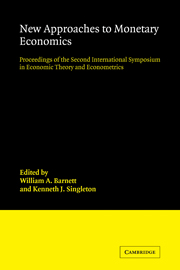 New Approaches to Monetary Economics
New Approaches to Monetary Economics Published online by Cambridge University Press: 04 August 2010
Abstract: This paper is concerned with the optimal inflation rate in an overlappinggenerations economy in which (i) aggregate output is constrained by a standard neoclassical production function with diminishing marginal products for both capital and labor, and (ii) the transaction-facilitating services of money are represented by means of a money-in-the-utility-function specification. With monetary injections provided by lump-sum transfers, the famous Chicago Rule prescription for monetary growth is necessary for Pareto optimality; but a competitive equilibrium may fail to be Pareto optimal with that rule in force because of capital overaccumulation. The latter possibility does not exist, however, if the economy includes an asset that is productive and nonreproducible – that is, if the economy is one with land. As this conclusion is independent of the monetary aspects of the model, it is argued that the possibility of capital overaccumulation should not be regarded as a matter of theoretical concern, even in the absence of government debt, intergenerational altruism, and social security systems or other “social contrivances.”
Introduction
Most of the existing analyses of the optimal inflation rate that have been carried out in models with finite-lived individuals have reached conclusions that seem to contradict the famous Chicago Rule for optimal monetary growth. An exception is provided by McCallum (1983, p. 38), which suggests that analysis of overlapping-generations models is supportive of the Chicago Rule provided these models take account of the transactionfacilitating (i.e., medium-of-exchange) services of money.
To save this book to your Kindle, first ensure [email protected] is added to your Approved Personal Document E-mail List under your Personal Document Settings on the Manage Your Content and Devices page of your Amazon account. Then enter the ‘name’ part of your Kindle email address below. Find out more about saving to your Kindle.
Note you can select to save to either the @free.kindle.com or @kindle.com variations. ‘@free.kindle.com’ emails are free but can only be saved to your device when it is connected to wi-fi. ‘@kindle.com’ emails can be delivered even when you are not connected to wi-fi, but note that service fees apply.
Find out more about the Kindle Personal Document Service.
To save content items to your account, please confirm that you agree to abide by our usage policies. If this is the first time you use this feature, you will be asked to authorise Cambridge Core to connect with your account. Find out more about saving content to Dropbox.
To save content items to your account, please confirm that you agree to abide by our usage policies. If this is the first time you use this feature, you will be asked to authorise Cambridge Core to connect with your account. Find out more about saving content to Google Drive.